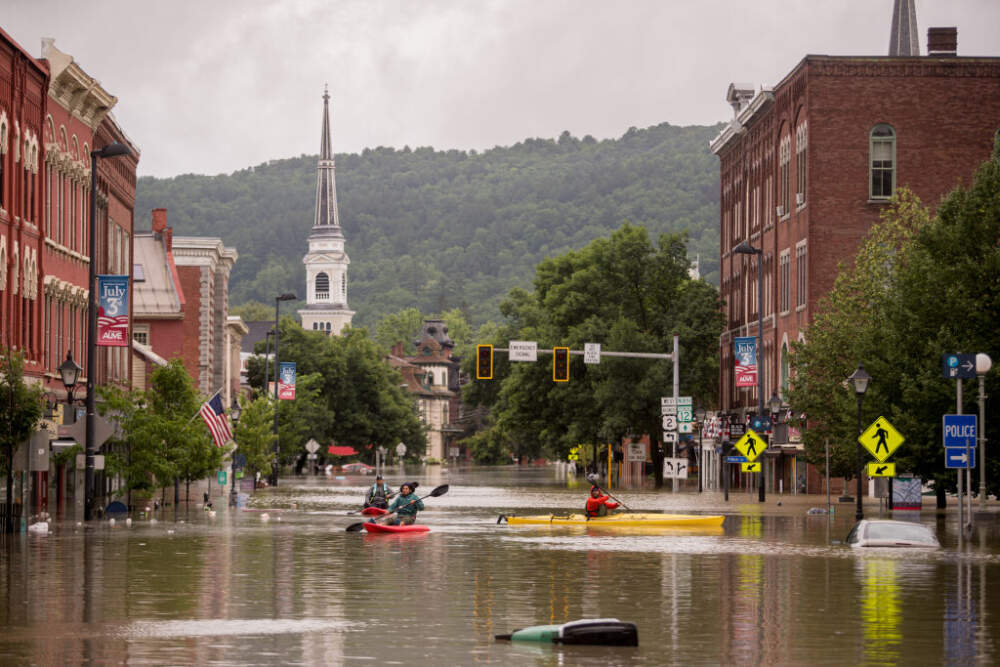It was hot on July 5, so and I was determined to get into the water at Good Harbor Beach no matter how cold it was. Ocean temperatures on Cape Ann are famously chilly. July averages around 65 (F); in August, its averages 67(F), though it can be a cold as 60.
As I walked from the parking lot, heading toward the water, I asked a woman wrapped in a towel what it was like. She didn’t say “refreshing” or “brisk” -- or any of the Gloucester euphemisms for friggin’ cold.
She gushed, “It’s wonderful. You have to go in! It’s like 70 degrees.”
Seventy degrees on the North Shore is like a gift from Neptune.
And it was divine. No need to inch forward, toe, ankles, knees, butt, and perhaps a quick dunk before scurrying back to the towel and the relief of a hot sun. The woman in the parking lot wasn’t exaggerating. I could walk straight through the shallows and dive in. I body surfed, I floated on my back. I licked my salty lips.
Life was good until I left for home. When I turned on the car radio I learned that it was the hottest day ever recorded on planet Earth — and not only on land, but also in the ocean. And with that, I felt like a frog in the proverbially slowly boiling pot of water, lulled to sleep while the heat cooked its goose.
I body surfed, I floated on my back. I licked my salty lips.
The frog story, used countless times to describe our woefully inadequate response to rising temperatures, is an apologue (vocabulary word of the day); a “satire in action” that differs from a parable in having little or nothing to do with reality.
In fact, if you put a frog into a slowly warming pot of water, it will, like any cold-blooded amphibian, get the hell out of there long before it’s in any danger.
Humans are not so endowed, but we do have brains that allow us to fabricate wetsuits and air conditioning and pretend the planet isn’t coming to a boil.
In this, we are also likened to ostriches, who are said to bury their heads in the sand to make themselves invisible to predators. It’s another apologue — a myth that demonstrates human stupidity — about our proclivity to avoid bad news or disturbing information.
But it’s getting harder to deny the climate emergency. Eggs are frying on sidewalks in Arizona — Phoenix just experienced its longest-ever stretch of consecutive 110-degree days. Rivers are raging in western Massachusetts and New York and Vermont, where Montpelier, the capital, was flooded, and closed to traffic. The smoke from wildfires in Canada is not finished with us yet.

We can’t pretend our canaries aren’t dying. That’s not an apologue, but a real example of how the natural world can make us understand the danger we’re in. Coal miners did bring caged birds into the pit and when the canary keeled over, it was time to get out, away from toxic fumes.
As the grim drumroll of climate doom gets harder to ignore, there’s a new animal metaphor in use. Many of us are beginning to resemble the meerkat — a cute little African mongoose — that turns into a model of tense hypervigilance in the face of existential threats.
Climate meerkats are hypervigilant about climate disasters, searching out ever more facts, statistics and heart-breaking documentaries about how disappearing polar ice is threatening extinction of bears and birds.
Too much climate doom-scrolling can bring on despair and depression. Indeed, the American Psychology Association has identified eco-anxiety as a diagnosable syndrome, defined as “the chronic fear of environmental cataclysm that comes from observing the seemingly irrevocable impact of climate change and the associated concern for one's future and that of next generations.”
We know despair can be as deadly as willful ignorance. So, what’s a sentient human to do?
You could sign up for pioneering environmental activist Bill McKibben’s podcast.
Get inspired by how young people are demanding climate justice.
Eat less meat.
Take a walk in the woods, or near the ocean. Look up at the night sky.
And when it seems the planet is on fire, there’s nothing like the poetry of Mary Oliver, psalmist of the natural world, to remind me of the peace, awe and solace to be found in the mountains and meadows, wetlands and forests. From that perspective, working for the health of the planet is not merely about self-preservation but a labor of gratitude and love.
Why I Wake Early
By Mary OliverHello, sun in my face.
Hello, you who make the morning
and spread it over the fields
and into the faces of the tulips
and the nodding morning glories,
and into the windows of, even, the
miserable and crotchety–
best preacher that ever was,
dear star, that just happens
to be where you are in the universe
to keep us from ever-darkness,
to ease us with warm touching,
to hold us in the great hands of light–
good morning, good morning, good morning.
Watch, now, how I start the day
in happiness, in kindness.
https://news.google.com/rss/articles/CBMiaWh0dHBzOi8vd3d3LndidXIub3JnL2NvZ25vc2NlbnRpLzIwMjMvMDcvMTMvY2xpbWF0ZS1jaGFuZ2Utd2VhdGhlci1uYXR1cmFsLWRpc2FzdGVyLXZlcm1vbnQtYW5pdGEtZGlhbWFudNIBAA?oc=5
2023-07-13 09:10:23Z
CBMiaWh0dHBzOi8vd3d3LndidXIub3JnL2NvZ25vc2NlbnRpLzIwMjMvMDcvMTMvY2xpbWF0ZS1jaGFuZ2Utd2VhdGhlci1uYXR1cmFsLWRpc2FzdGVyLXZlcm1vbnQtYW5pdGEtZGlhbWFudNIBAA
Bagikan Berita Ini














0 Response to "Despair won't save the planet. But gratitude and love might - WBUR News"
Post a Comment